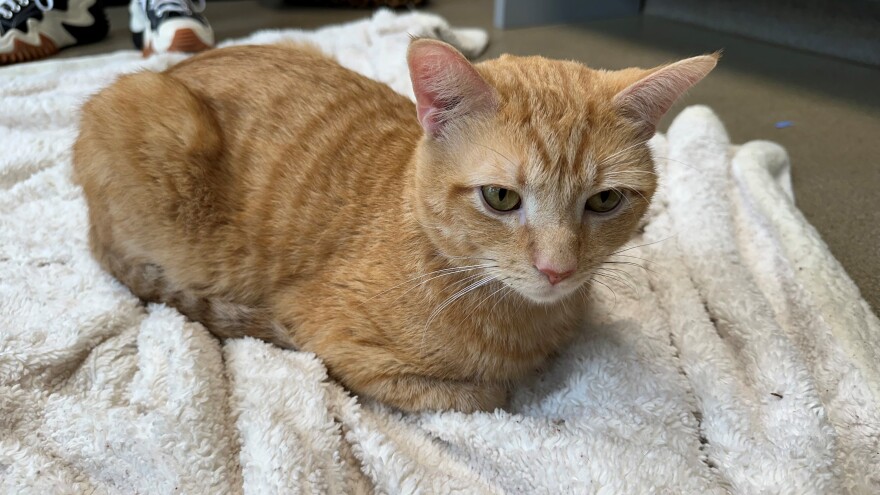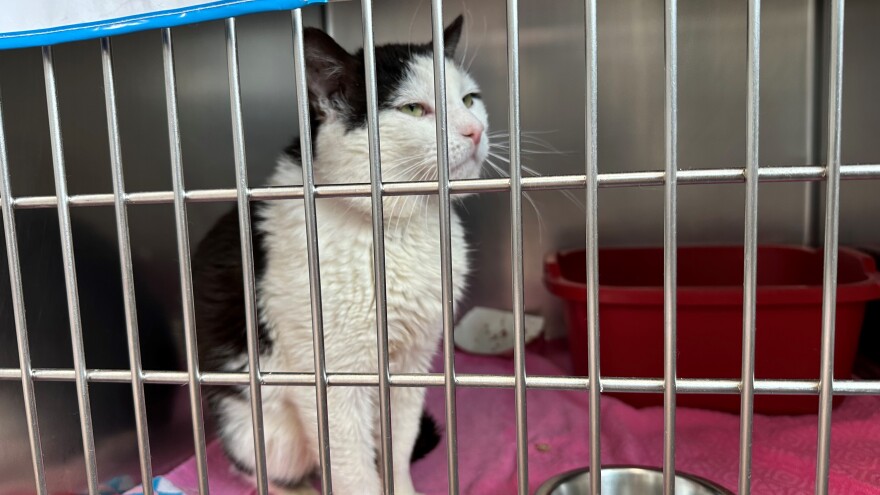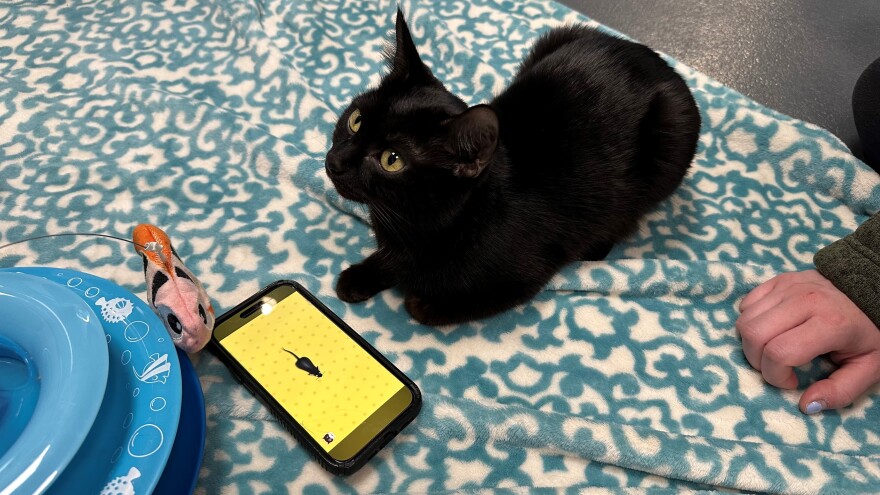ALLENTOWN, Pa. — If the celestial event on April 15 was a bit of a letdown for anyone in the Lehigh Valley, prepare for pure joy from a total Eclipse of the heart.
You may have noticed the grass is a little greener, allergies are rampant, and temperatures have climbed just a bit.
And of course, that can only mean one thing: it’s kitten season — the magical time of year when cat mating hits a peak, leading to swarms of kitties and plenty of problems at rescues.
While adopting a tiny cat is a great idea, if you’re looking for a little pal, you may want to consider other options, including older cats who also need some love and attention.
One such feline is 5-year-old orange boy Eclipse, who was welcomed into his fur-ever home just last week.
Overabundance of kittens, hard times
Lehigh Valley Humane Society Chief Development Officer Jackie Folsom said that in 2023, her organization got more than 1,000 requests to surrender pets for various reasons, including “people who were coming in who were likely pretending to have found a cat that really was their cat.”
“I think a big reason that so many people were struggling with pet ownership in 2023 was because people are really struggling financially," Folsom said.
"A lot of people have been struggling to find affordable housing, and have been struggling with eviction, and not every place allows pets, or maybe they have more than the allowed number of pets, which is usually something like two if you're renting.

“So it was a huge boom in our intake."
Over all, Folsom said, the humane society had nearly 3,400 animals come in 2023. That's an increase of 900 animals over — about 600 more cats and 300 more dogs.
Folsom speculated that may have been the situation Eclipse faced, as he was brought in with two females named Gatsby and Eva, all of whom were clean and appeared to have been cared for.
Adding to the problem is the “tremendous outdoor cat population” across the country, Folsom said. That can include fully feral felines along with indoor/outdoor pets that have not been spayed or neutered.
'I want a black cat'
As of mid-April, things this year haven’t been all too busy at the Lehigh Valley Humane Society, but the team is anticipating plenty of cats and kittens shortly.
“We've had a couple of moms and babies come in, and they've all gone into foster. We always want to get kittens out as early as we can, because kittens have really weak immune systems being that they’re babies and shelters are environments where cats can very easily get sick."Lehigh Valley Humane Society Chief Development Officer Jackie Folsom
“We've had a couple of moms and babies come in, and they've all gone into foster," Folsome said. "We always want to get kittens out as early as we can, because kittens have really weak immune systems being that they’re babies and shelters are environments where cats can very easily get sick.
"Cats are easily stressed, and when their stress is high, their immunity is low. So we want to get them out into foster homes where they can be healthy, and not get sick at all.”
Kittens with a mama cat are easier to foster, Folsom said, as they only require food, water and litter, whereas orphaned and neonatal kittens require far more intensive care.
Adopting out those babies out isn’t too difficult a task, as they’re particularly cute and often enough, Folsom said.
“It is almost like a right of passage for young couples who maybe are getting their first place," she said. "They always seem to want to get a kitten together.
“So a lot of times people do come in here with a preconceived notion of what they want. They say, ‘I want a black cat’ or ‘I want a cat that's really good with other cats,’ or ‘I want a cat of a specific age."

“But if they're open, we will either suggest maybe a favorite or a long-term resident or one that we just know would suit what they're looking for.
"And, you know, if you're looking for cats who are particularly playful, they don't have to be a baby. They could be a 1- or 2-year-old cat. And a lot of our cats are very young and still playful."
Lehigh Valley Humane Society can accommodate 150 to 200 cats, with the potential for even more kittens, as they’re smaller and must be kept together with their litter until they come of age for adoption.
On occasion, the facility has to use pop-up cages or crates to fit a few more furry friends in a safe space.
Promoting adoptions, saving lives
To promote adoptions, the Humane Society keeps track of social media trends and hops on board to feature some furry friends.
“It was just a great idea because of what we had going on to name the cat Eclipse,” Folsom said. She said the little guy got plenty of online attention thanks to his name during the recent solar eclipse.
"I love doing stuff like that, and that definitely helped him get adopted.”Lehigh Valley Humane Society Chief Development Officer Jackie Folsom
“I remember around Valentine's Day when people were absolutely freaking out about the Valentine's edition Stanley Cup that was coming out, and people were fist-fighting over it, we got a dog and we named him Stanley," she said.
"And then we use that in marketing. I love doing stuff like that, and that definitely helped him get adopted.”
Cat rooms, which allow visitors at the humane society to visit with a prospective pet, can be very helpful in matching a pet to an owner.
That's particularly true when it comes to more outgoing felines who “sell themselves,” Folsom said. But she encouraged people to give some of the more shy and apprehensive ones a chance.

Soon, Folsom said, the humane society will work on collecting supplies for the upcoming kittens by starting a baby registry and holding adoption events.
“So basically, just like a wish list, but we're calling it a baby registry," Folsom said. "It'll be for things like kitten formula and blankets, heating pads, those sort of things.”
For those who would like to help out but can’t take in a foster or adopt, Folsom recommends donating money or supplies, or volunteering.
Details about all those endeavors can be found on the Humane Society website.
'Not easy to rehome a pet'
If you already have a pet cat, make sure to have them spayed or neutered, especially if they tend to get outside, Folsom said.
And if you live in an area with what appears to be a cat colony or a large number of ferals, look into trap/neuter/release programs in your area.
According to Folsom, pet dumping has become such an issue because of various factors. Many rescues have introduced programs providing free or reduced-cost care, along with food and other supplies.
“Be realistic and honest with yourself about your lifestyle and whether it's a good idea to bring that pet into the home in the first place."Lehigh Valley Humane Society Chief Development Officer Jackie Folsom
“We're here to provide those affordable, accessible services to people to help them keep their pet in their home,” Folsom said.
“We just want to be a temporary-step sanctuary for animals on their way to their forever home. This is not an ideal environment for any animal, it can be very stressful. It's not the ideal for any animal, obviously, to be in a shelter.”
For those who can no longer care for a pet, Folsom recommends visiting websites such as Adopt a Pet or Pet Finder to rehome the animal in a safe, secure environment.
But before even considering swinging by a shelter — avoid breeders, as there are numerous problems with the practice, she said — think about your prospective future with your potential furry friend.
“Be realistic and honest with yourself about your lifestyle and whether it's a good idea to bring that pet into the home in the first place," Folsom said.
"Because it's probably not going to be easy to rehome that pet just because of the environment that animal welfare is in right now."
And if you’re ready to take that step, consider older kitties such as Eclipse. You just might light up their little lives.


